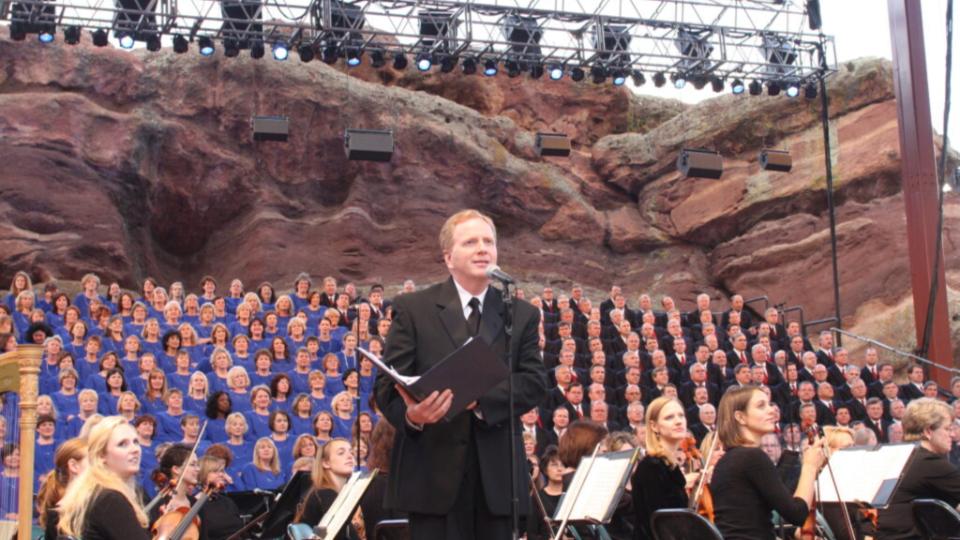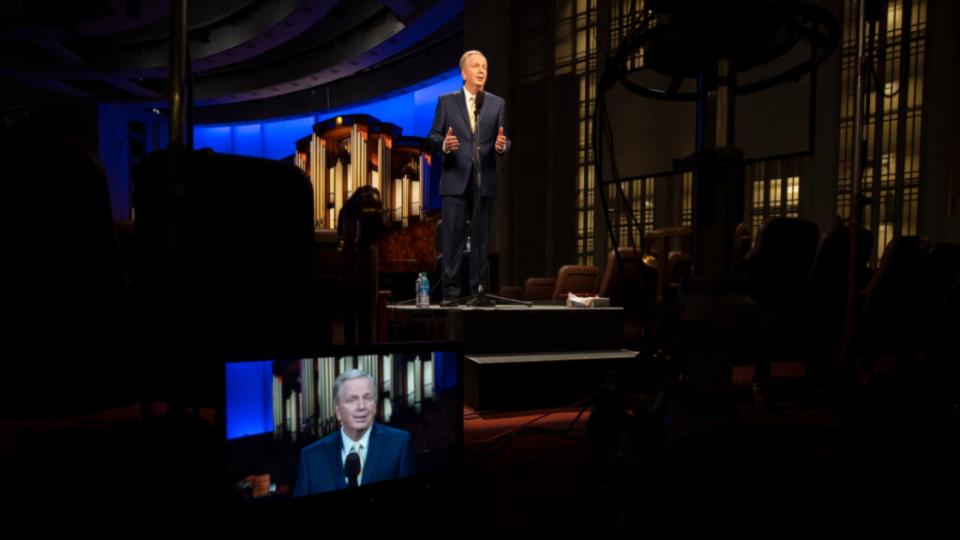- Newell-3.jpeg
- Newell-2.jpeg
- Newell-1.jpg
- Newell-12.jpg
- Newell-4.jpg
- Newell-5.jpeg
- Newell-6.jpeg
- Newell-7.jpeg
- Newell-8.jpeg
- Newell-9.jpg
- Newell-10.jpg
- Newell-11.jpg
| Temple Square is always beautiful in the springtime. Gardeners work to prepare the ground for General Conference. © 2012 Intellectual Reserve, Inc. All rights reserved. | 1 / 2 |
This story appears here courtesy of TheChurchNews.com. It is not for use by other media.
By Christine Rappleye, Church News
The Conference Center auditorium, which can seat up to 20,000 people, is empty except for a small crew around a platform with a camera and lights in the middle of an aisle in the lower section on a recent weekday afternoon.
When Lloyd Newell, who hosts the weekly “Music & the Spoken Word” broadcast, approaches and greets the crew, he’s in a suit and carrying a half-dozen colorful ties.
He stands on the platform with the towering organ pipes, vacant choir seats and orchestra area behind him. On cue, he begins to share a “Spoken Word” that is being recorded and will be inserted in a future Sunday morning broadcast. With a drink of water and a quick tie change while visiting with the masked producer and cameraman, he’s back on the platform preparing to record another one.
Newell officially became the announcer of “Music & the Spoken Word” 30 years ago, on March 31, 1991.
“The music is timeless,” Newell said. The “Spoken Word” message “gives us a chance to talk about what’s going on in the world and to offer perspective and hope.”
‘Spoken Word’ Announcers
The Tabernacle Choir at Temple Square’s Sunday morning show first aired more than 91 years ago on July 15, 1929, with 19-year-old Ted Kimball standing on a ladder to announce each musical number.
Richard L. Evans was the first regular announcer of “Music & the Spoken Word” from the summer of 1930 until 1971 — more than 41 years. Spence Kinard presented the “Spoken Word” from 1972 to 1990.

Newell-5.jpeg
Lloyd Newell announces the program for the Tabernacle Choir at Temple Square concert at Red Rocks Amphitheater near Denver, in 2009. Photo by Gerry Avant, courtesy of Church News.Copyright 2021 Deseret News Publishing Company.Newell’s first official time presenting the “Spoken Word” was on March 31, 1991. He had been filling in since the end of November 1990.
When he was extended the calling, President Gordon B. Hinckley, then a counselor in the First Presidency, said that each week’s message needed to be an “inspirational gem.”
“Those two words ring in my ears and in my heart all the time,” he said. When he writes the “Spoken Word” messages, he will ask himself: “Is this an inspirational gem? Does it enlighten and inspire? Does it add an insight or perspective that is wise and interesting and encouraging?”
President Hinckley also told him that this call would change his life, Newell said. “President Hinckley was right, it has changed my life and my family’s life for the better. He understood it far better than I did. … I think he certainly had a greater vision for it than I did at the time.”
Newell had worked as television anchor and at the time of his call was traveling the world as a corporate trainer and consultant.
“When I did the news, no one ever came up to me after a newscast and said that newscast really touched my heart or that really made a difference in my life,” he said. But with the “Spoken Word” messages, “I’m blessed to hear that all the time.”
30 Years Ago
When Newell began, he was single. Now, he’s married with four grown children and grandchildren.
When he announced his engagement to Karmel Howell in January 1992, the choir serenaded them with “Let Me Call You Sweetheart,” according to information from the choir. Through the years, his family would watch it “live” on television and also record the broadcast so they could watch it later in the day.
Newell credits his wife and family for their constant support over the many years. “I could not have done this calling without my wife by my side, and the love and support of my family.”

Newell-8.jpeg
Lloyd Newell has officially been the voice of the Tabernacle Choir since 1991. Photo by Tom Smart, courtesy of Church News.Copyright 2021 Deseret News Publishing Company.Newell, who is a professor of religious education at Brigham Young University, works several weeks in advance on the “Spoken Word” messages. Ideas come from everywhere and anywhere. And he doesn’t have a favorite — it’s too difficult to pick just one.
“My antenna is always raised because I’m always looking for ideas and stories, universal principles and timeless truths that would make for a good ‘Spoken Word,’” Newell said.
With a visible calling that he makes look easy, Newell said there have been personal challenges along the way.
“I’ve had many times of feeling inadequate,” Newell said. “How can I capture what I want to say or what I’m feeling and how can I deliver it in a way that would make a difference?”
When he writes the “Spoken Word,” he tries to think of a person. For many years, that person was his late mother. Sometimes, it will be a person in the congregation. Other times, another loved one or friend or someone he knows.
As he reflected on 30 years of his association with the choir, Newell highlights the opportunities of touring with the choir and orchestra as they’ve performed in the United States and across the world and presenting a “Spoken Word” message during the concerts, along with building relationships with people, from those performing to those behind the cameras and in the production booths. And since his weekly “Spoken Words” are nondenominational messages, he treasures the many associations and interactions he’s had with people from all walks of life and all religious backgrounds across the world.
“The essence of the broadcast remains still the same,” Newell said of the program. “There is beautiful music from the Tabernacle Choir at Temple Square and an inspirational message. It’s different now as the technology has changed with more digital equipment and modern technology and that it goes beyond a radio and TV program to reaching countless people through online platforms.
“With this broadcast, we’re trying to spread hope and goodness, truth and light,” he said.
Encore Performances
When the COVID-19 pandemic started more than a year ago and many events shut down or were paused, including the Tabernacle Choir and Orchestra at Temple Square’s events and rehearsals, Newell found himself at home on Sunday mornings.
“It was very strange,” Newell said with a smile. While his family has been able to celebrate Sunday holidays, such as Mother’s Day, Father’s Day and Easter, in a more traditional way, he’s felt like there should be something more that he could do.

Newell-4.jpg
Lloyd Newell records several upcoming portions of “Music & the Spoken Word” inside the Conference Center in Salt Lake City on Wednesday, April 7, 2021. Newell is celebrating his 30th anniversary as announcer of the Tabernacle Choir at Temple Square. Photo by Scott G. Winterton, courtesy of Church News.Copyright 2021 Deseret News Publishing Company.The Sunday morning “Music & the Spoken Word” continued to air from the repertoire of previous broadcasts and have been selected by choir director Mack Wilberg.
“We talked and asked, ‘Can we offer something?’” Newell said. “The one thing we can change without too much difficulty is the ‘Spoken Word.’”
Last summer, he started again writing more “Spoken Word” messages and they recorded a few that aired in the fall. And they recorded a few more in September that were also broadcast. They received encouragement to do the new “Spoken Word” messages at the end of December and have been doing them ever since.
“We can’t bring in 500 choir and orchestra members together right now, but I can come in with a small crew,” Newell said. “I never would have dreamed of recording ‘Spoken Word’ messages, and inserting them into previously aired broadcasts, but it’s such a wonderful way for us to be able to talk about this world that we’re living in and offer renewed hope and insight.”
On that recent afternoon in the nearly empty Conference Center, he recorded a half-dozen “Spoken Word” messages, changing ties between each one. Unlike the live broadcasts, he can rerecord these, if needed. As the production team is editing these into previous shows, he tries to make it closely fit in the time of the “Spoken Word” in the previous broadcast.
But, there is something unique about the energy of a live broadcast, he said.
“People are wondering and worried about the future and some are even losing hope,” he said. “We want to be a beacon of hope and light and truth and goodness to say there is goodness out there, there’s hope available — so stay with it and keep going. And just like this broadcast will be back in the coming day, we will be back as a nation and world.”
Copyright 2021 Deseret News Publishing Company